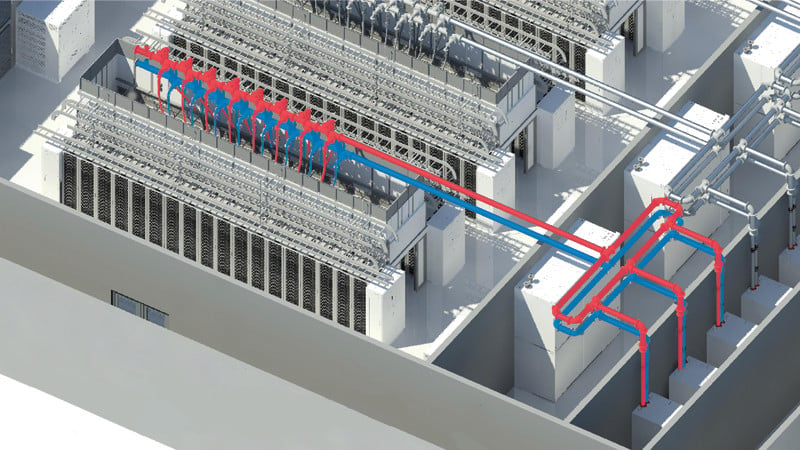Schneider Electric Plugs Into AI's Power Hunger With Nvidia Digital Twin Tech

GTC Schneider Electric has developed a digital twin system to simulate how an AI datacenter operates in order to accurately design for the appropriate power requirements.
The energy infrastructure biz says it worked with electrical digital twin specialist ETAP to develop the system, which is based on Nvidia Omniverse, the GPU giant's platform for building realistic simulated 3D worlds using the OpenUSD open source Universal Scene Description tech.
Announced at Nvidia's GTC 2025 event, the design tool will be available for Schneider's datacenter operator customers. It is set to provide them with better insight and control over the electrical systems and power requirements when building AI-enabled bit barns – what Nvidia fancifully likes to call "AI factories."
This need arises from AI workloads, which have been significantly increasing datacenter power consumption for some time. Unlike traditional tasks, AI operations such as model training require substantial compute power, leading to higher rack power densities and prompting some firms to rethink datacenter design and management.
Some deployments have seen power density increase from 10 kW to 30 kW per rack and are likely to go much higher, while traditional facilities were built around data halls with racks of just 2-5 kW. Liquid cooling also becomes a necessity for some of these high-density deployments, further complicating infrastructure planning.
"Together, ETAP, Schneider Electric, and Nvidia are not just advancing datacenter technology – we're empowering businesses to optimize operations and seamlessly navigate the power requirements of AI," claimed Pankaj Sharma, Schneider's VP for Data Centers, Networks & Services.
The digital twin platform allows users to create a virtual replica of their datacenter's electrical infrastructure and combine it with real-time power system data, advanced analytics, and insights to analyze and predict power consumption and distribution patterns, the firm says.
- Schneider Electric warns of future where datacenters eat the grid
- Schneider Electric ransomware crew demands $125k paid in baguettes
- Infrastructure giant Schneider Electric powers up with $850M liquid cooling deal
- Schneider Electric warns that existing datacenters aren't buff enough for AI
This means real-time performance tracking, energy usage optimization, "What if" scenario analysis, predictive maintenance, and system reliability assessments, according to Schneider.
"As AI workloads grow in complexity and scale, precise power management is critical to ensuring efficiency, reliability, and sustainability," commented Dion Harris, Nvidia's senior director of HPC and AI Factory Solutions.
"We're offering datacenter operators unprecedented visibility and control over power dynamics, empowering them to optimize their infrastructure and accelerate AI adoption while enhancing operational resilience."
The move follows Schneider's closure in February of a deal to take a controlling stake in Motivair, a specialist in liquid cooling and thermal management tech for high-performance computing (HPC) systems.
While Schneider already had its own cooling tech, Motivair had more experience with the high-density deployments required for AI. The company claimed that the acquisition gives it "the broadest portfolio when you look at that grid to chip, chip to chiller story." ®
From Chip War To Cloud War: The Next Frontier In Global Tech Competition
The global chip war, characterized by intense competition among nations and corporations for supremacy in semiconductor ... Read more
The High Stakes Of Tech Regulation: Security Risks And Market Dynamics
The influence of tech giants in the global economy continues to grow, raising crucial questions about how to balance sec... Read more
The Tyranny Of Instagram Interiors: Why It's Time To Break Free From Algorithm-Driven Aesthetics
Instagram has become a dominant force in shaping interior design trends, offering a seemingly endless stream of inspirat... Read more
The Data Crunch In AI: Strategies For Sustainability
Exploring solutions to the imminent exhaustion of internet data for AI training.As the artificial intelligence (AI) indu... Read more
Google Abandons Four-Year Effort To Remove Cookies From Chrome Browser
After four years of dedicated effort, Google has decided to abandon its plan to remove third-party cookies from its Chro... Read more
LinkedIn Embraces AI And Gamification To Drive User Engagement And Revenue
In an effort to tackle slowing revenue growth and enhance user engagement, LinkedIn is turning to artificial intelligenc... Read more


